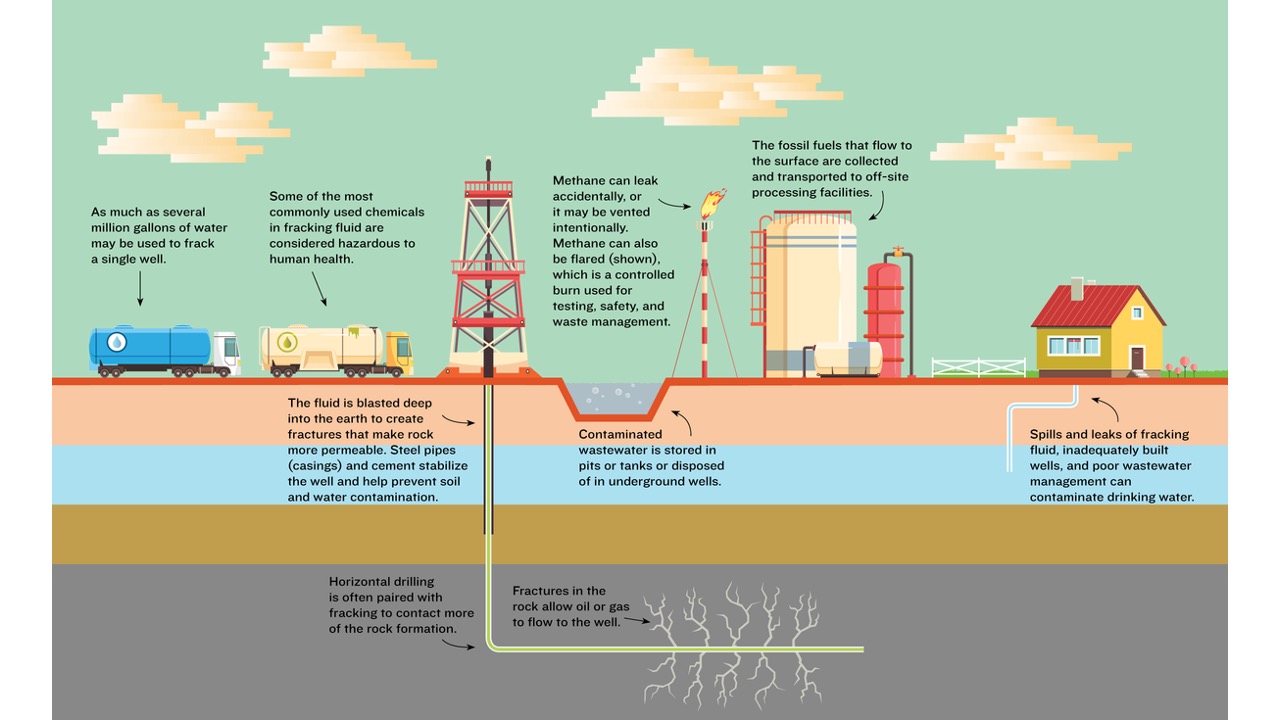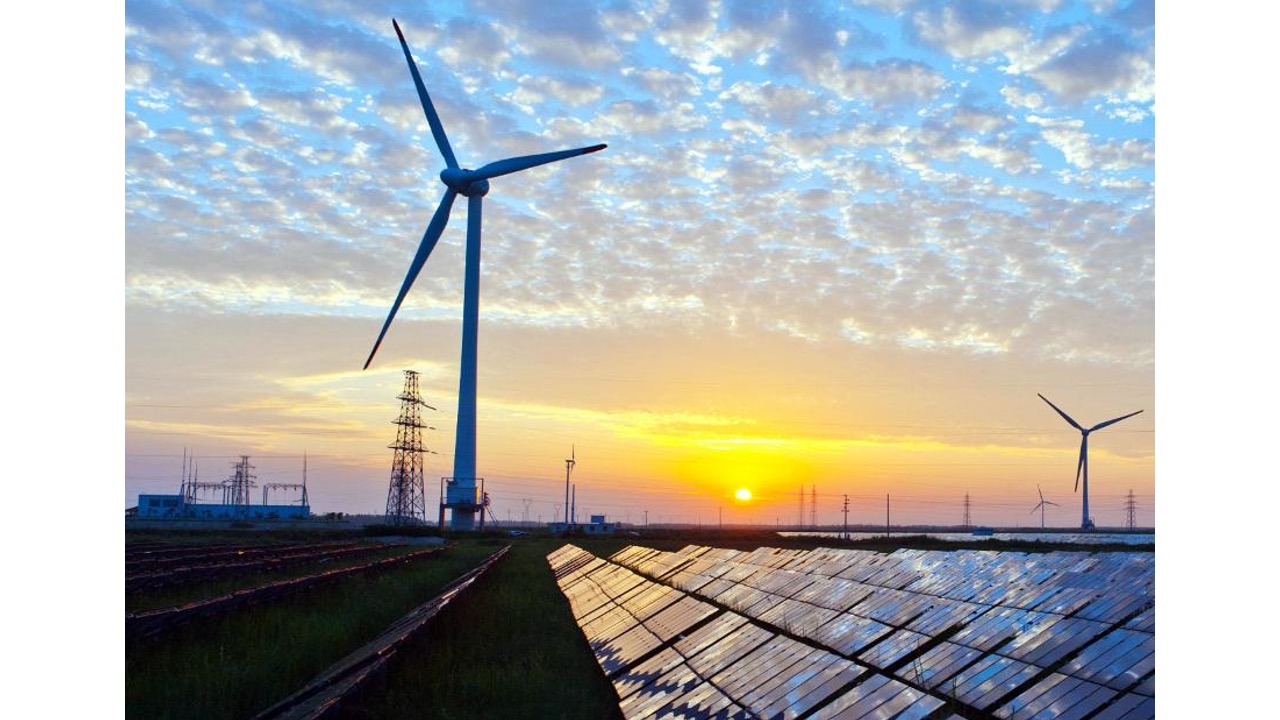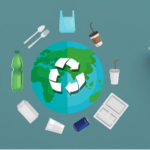The Issue of Fracking in Maryland
By Amalia Villegas Vega, Bethesda Green Environmental Leader
Fracking, or hydraulic fracturing, is a serious environmental issue, and though the practice is banned in Maryland, it continues to have a severe impact on the state and Chesapeake Bay because of fracking in nearby states. Fracking is a way of “extracting natural gas or oil from ‘tight’ rock formations” (April). The process requires fluid (as much as 97% water and chemical additives) being blasted below the surface of the earth to “crack sedimentary rock formations… to unlock natural gas and crude oil reserves” (April).
According to an NRDC article by Melissa Denchak, this process is as dangerous and destructive to the environment as it sounds. According to the Natural Resources Defense Council, the chemicals used in the fracking fluid can be “hazardous to human health” while other chemicals have unknown impacts like much of the fracking process itself. It is known, however, that fracking “consumes a massive amount of water” (between 1.5 and 16 million gallons per well). The water used for fracking depletes valuable resources as it is typically fresh water, either groundwater or surface water. Furthermore, fracking itself pollutes drinking water resources according to a 2016 EPA Analysis primarily through spills, leaks, inadequately built wells, and poor wastewater management (Denchak). Additionally, between 20-50 percent of water comes back to the surface “contaminated with salt, minerals, chemicals, and sometimes naturally-occurring radioactive isotopes” while the rest which remains underground can affect groundwater and local streams (Natural gas…). Finally, the “intense industrial development” required for fracking can “fragment forests and rural landscapes and degrade important wildlife habitats” (Denchak).

Image Source: Natural Resources Defense Council Inc.
In the state of Maryland, the practice of fracking has been banned since March 2017 when the Maryland General Assembly passed House Bill 1325 as reported by Chesapeake Climate Action Network (We banned…). In doing so, Maryland became “the first state in America with proven gas reserves to ban fracking by legislative action” (We banned…). This ban clearly prohibits the direct action of fracking in the state of Maryland, yet it continues to be both a global and local issue.
The trade of natural gas extracted through fracking in Maryland has made it a “global gateway” even though the practice is banned within the state (“Fracked gas from Pennsylvania and other states is being piped to an export terminal at Cove Point on the Chesapeake Bay in Southern Maryland, then shipped around the world”) (Rector, K). There is a new gas export terminal near Cove Point Beach in Calvert County Maryland to which natural gas pulled from Pennsylvania and other states is piped. Once the gas is at the terminal, “it is cooled to minus 260 degrees Fahrenheit which liquefies it and makes it easier to transport” (Rector, K). It is then shipped overseas, the largest consumer being Japan.
This is a clear issue in the state of Maryland because although the environmentally detrimental act of fracking is banned within state borders, the state continues to be a large contributor to the fracked oil market. It is contradictory for Maryland, the first state to ban fracking with proven gas reserves, to be a “global gateway” for fracked gas with a terminal “responsible for more than 1 million metric tons of greenhouse gas emissions in 2018” (Rectory, K).
Outside of the state of Maryland, much of the Chesapeake Bay watershed continues to hold hydraulic fracturing operations. While natural gas drilling is not new to the watershed and has been occurring for decades, fracking has “made once unobtainable underground natural gas sources accessible” (Natural gas…). Previously “pristine” and “sensitive” areas within the Chesapeake Bay watershed “face an ever-growing wave of industrialization) (Natural gas…). This further contributes to the issue of habitat destruction in the Chesapeake Bay. The primary area affected is called the Marcellus Shale rock formation which lies under parts of New York, Pennsylvania, Ohio, Maryland, Virginia, and West Virginia.
Natural gas extracted through fracking can be used residentially, commercially, industrially, for power generation, and transportation. It can be used for things like stoves, dryers, heating and cooling, preheating metals, glass melting, food processing, operation of gas turbines, and fuel for various automobiles (Why is fracking…). Natural gas is a primary source of energy, but there are ways that you can combat the issue of fracking.

Image Source: Wikimedia Commons
The best way to not contribute as much to the fracking and usage of natural gas is to use renewable energy within your own home. Renewable energy is also known as “green energy” or “clean energy” and uses energy sources that are “naturally replenished” such as the sun, wind, biomass, and water. They also “emit no or hardly any greenhouse gases” (Seven ways…). Ways you can convert to renewable energy is by installing solar panels on your roof to generate clean electricity. You can also use win energy through smaller wind turbines that are available for homes.
Works Cited
Denchak, M. (2021, April 19). Fracking 101. NRDC. Retrieved March 19, 2021, from https://www.nrdc.org/stories/fracking-101
Natural gas drilling & hydraulic fracturing. (n.d.). Retrieved March 19, 2021, from https://www.cbf.org/issues/natural-gas-drilling/natural-gas-drilling-and-hydraulic-fracturing.html
Rector, K. (n.d.). Maryland, which bans fracking, is a global gateway for fracked gas. Here’s how. Baltimoresun.Com. Retrieved March 19, 2021, from https://www.baltimoresun.com/politics/bs-md-lng-takeaways-20190318-story.html
Seven ways to power your home with renewable energy. (2020, November 8). Eon Energy. https://www.eonenergy.com/spark/ways-to-power-your-home-with-renewable-energy.html
We banned fracking in Maryland. (n.d.). Chesapeake Climate Action Network. Retrieved March 19, 2021, from https://chesapeakeclimate.org/maryland/fracking/
Why is fracking for natural gas important? (n.d.). Retrieved March 19, 2021, from https://www.api.org:443/oil-and-natural-gas/energy-primers/hydraulic-fracturing/why-is-fracking-for-natural-gas-important
About the author:
 Amalia Villegas Vega, Bethesda Green Environmental Leader
Amalia Villegas Vega, Bethesda Green Environmental Leader
Amalia Villegas Vega is a Senior at St. John’s College High School. She is passionate about protecting the environment and is looking forward to making local change with Bethesda Green. Her passions other than the environment include music, theater, and journalism.





